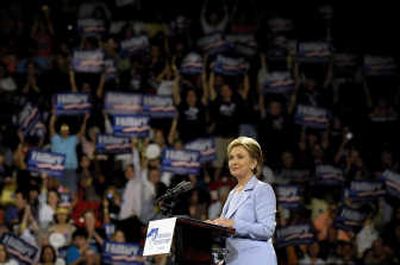Democrats heat up gas tax rhetoric

RALEIGH, N.C. - Democratic presidential candidates Hillary Rodham Clinton and Barack Obama escalated their debate Friday over rolling back gasoline taxes, with Obama criticizing her plan to suspend the tax this summer as a costly “political stunt” and Clinton casting the issue as a choice between standing with consumers or the oil industry.
Clinton, sounding a populist tone throughout the day, leveled a sharp blast at energy traders, OPEC nations and the energy industry, calling for a federal investigation of possible market manipulation and urging a much tougher stance toward the energy-producing nations, including possible legal action before the World Trade Organization.
With both candidates vowing to help turn around the sagging economy, the debate over the gas tax has emerged as one of the most substantive domestic disagreements between Clinton and Obama in their long battle for the Democratic nomination. Although the prospects of any action in Congress appear minimal, the challengers have approached their debate confident that it can help them in the short term.
But the dispute also has highlighted the fundamental differences in the broader messages that each is driving home to voters before Tuesday’s primaries in Indiana and North Carolina. Obama portrays the proposal to suspend the gas tax as a meaningless gimmick that embodies the worst of the old politics and his opposition to it as evidence that he will change the system. Clinton sees the proposal as proof of her willingness to stand with hard-pressed families against the power of corporate interests.
Like Clinton, whose recent mantra has been “jobs, jobs, jobs and jobs,” Obama has been focusing on the economy. He opened a news conference in Indianapolis saying that wage and job numbers released Friday provide further evidence of an economy that has grown “worse and worse in recent months.”
He pivoted immediately to criticize Clinton and the gas tax proposal. He described the idea, which Clinton and Sen. John McCain, the presumptive Republican nominee, support in different forms, as an example of Washington politics that have “been more about scoring points than solving problems.”
“At best, this is a plan that would save you pennies a day for the summer months,” Obama said in a message he repeated at a steel factory in Munster, Ind. “That is, unless gas prices are raised to fill in the gap, which is just what happened in Illinois, when we tried this a few years ago.”
Obama said the “McCain-Clinton gas tax gimmick” has little support in Congress. He invoked the comments of House Speaker Nancy Pelosi, D-Calif., and House Majority Leader Steny Hoyer, D-Md., as well as of Sen. Tom Harkin, D-Iowa, and New York Democratic Gov. David Paterson, a Clinton superdelegate. Obama also disputed Clinton’s assertion that a divided Congress could pass new taxes on oil companies to make up the difference.
“Unless you can magically impose a windfall-profits tax on oil companies overnight to pay for the holiday,” Obama said, “it could imperil federal highway funding, and cost Indiana more than 6,000 jobs.”
In North Carolina, Clinton fired back, criticizing Obama for opposing the idea altogether and McCain for his unwillingness to force oil companies to bear the cost.
“We have a choice,” she said in Hendersonville, in western North Carolina. “We can choose to have you continue to pay the federal gas tax this summer, or we can choose to try to make the oil companies pay it out of their record profits. This is the kind of choice that I believe we should be trying to make, because I know where I stand and I know where my opponents stand.”
She said that while the nation needs a long-term energy plan, the issue now is whether leaders will provide short-term assistance, however small, to families whose budgets are stretched by the increase in gas prices. “I want the Congress to stand up and vote,” she said in Kinston. “Are they for the oil companies, or are they for you?”
Going after the oil companies was only part of Clinton’s energy message. She accused energy traders of manipulating oil prices and called for the Justice Department and the Federal Trade Commission to investigate. “It is a fact they are manipulating the oil and gas market,” she said.
As for OPEC, she said it is time for the United States to get tough with the cartel, and called for “some creative lawyers” to figure out how to take OPEC nations before the World Trade Organization for relief. “This is not a free ride anymore,” she said.
Clinton also called for releasing oil from the Strategic Petroleum Reserve to help hold down prices.
All week in Indiana and North Carolina, Obama has been trying to counter the populist appeal of the proposed three-month tax holiday by repeating estimates that pegged the average savings at $28 per family, or about 30 cents a day. That would not pay for a daily cup of coffee at 7-Eleven, he likes to say.